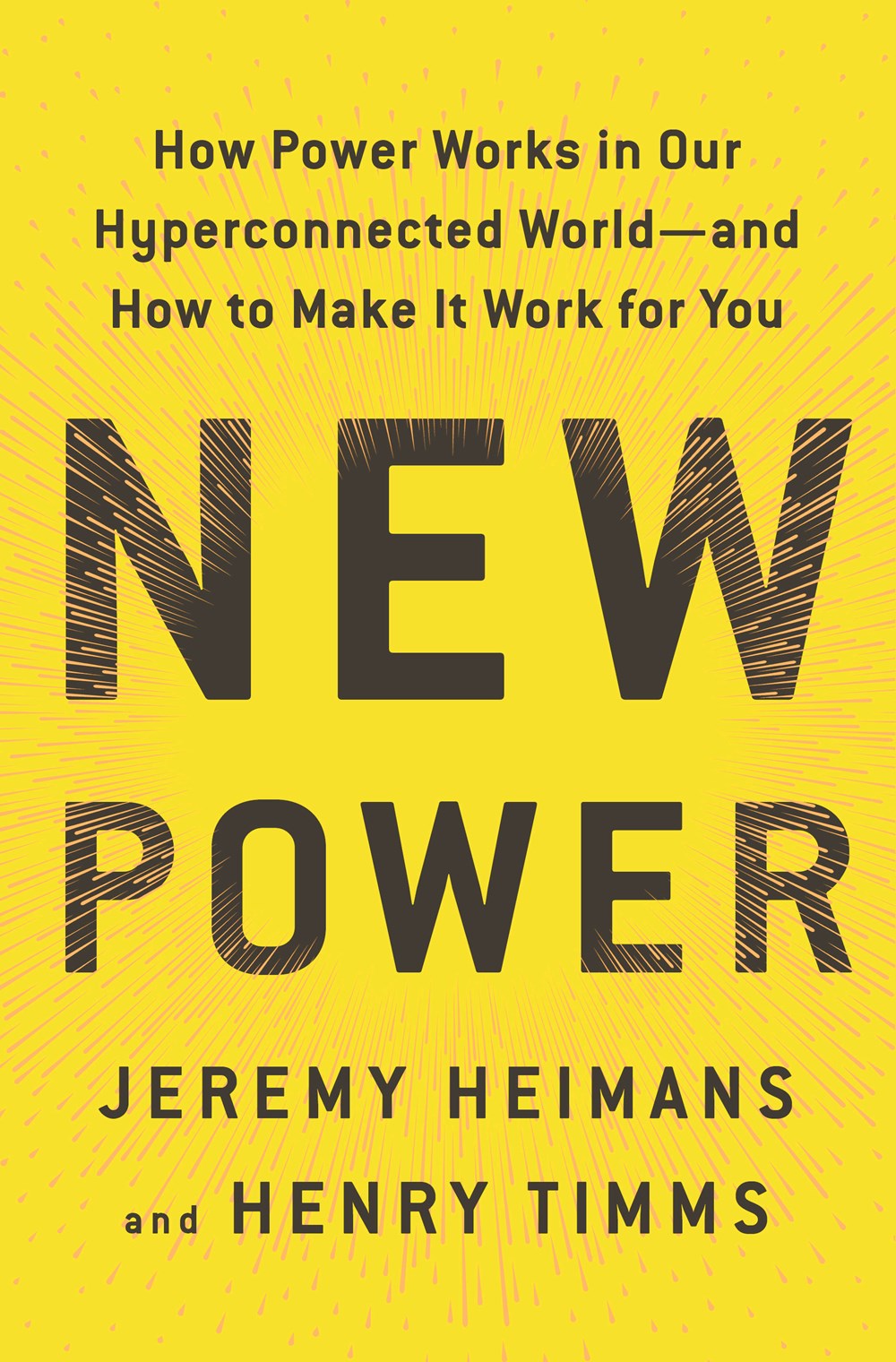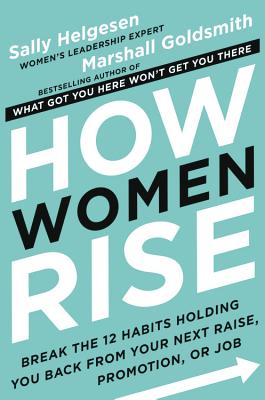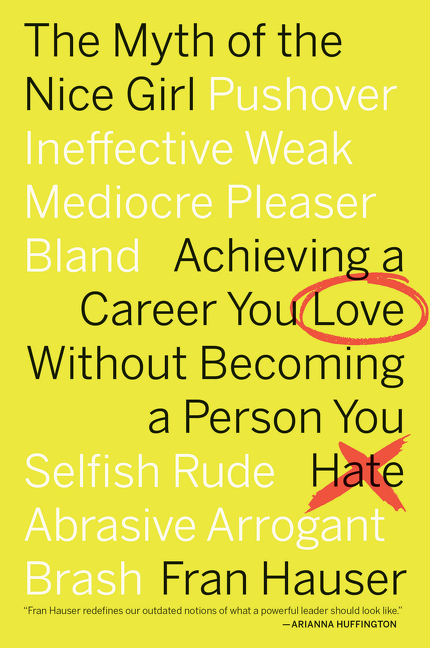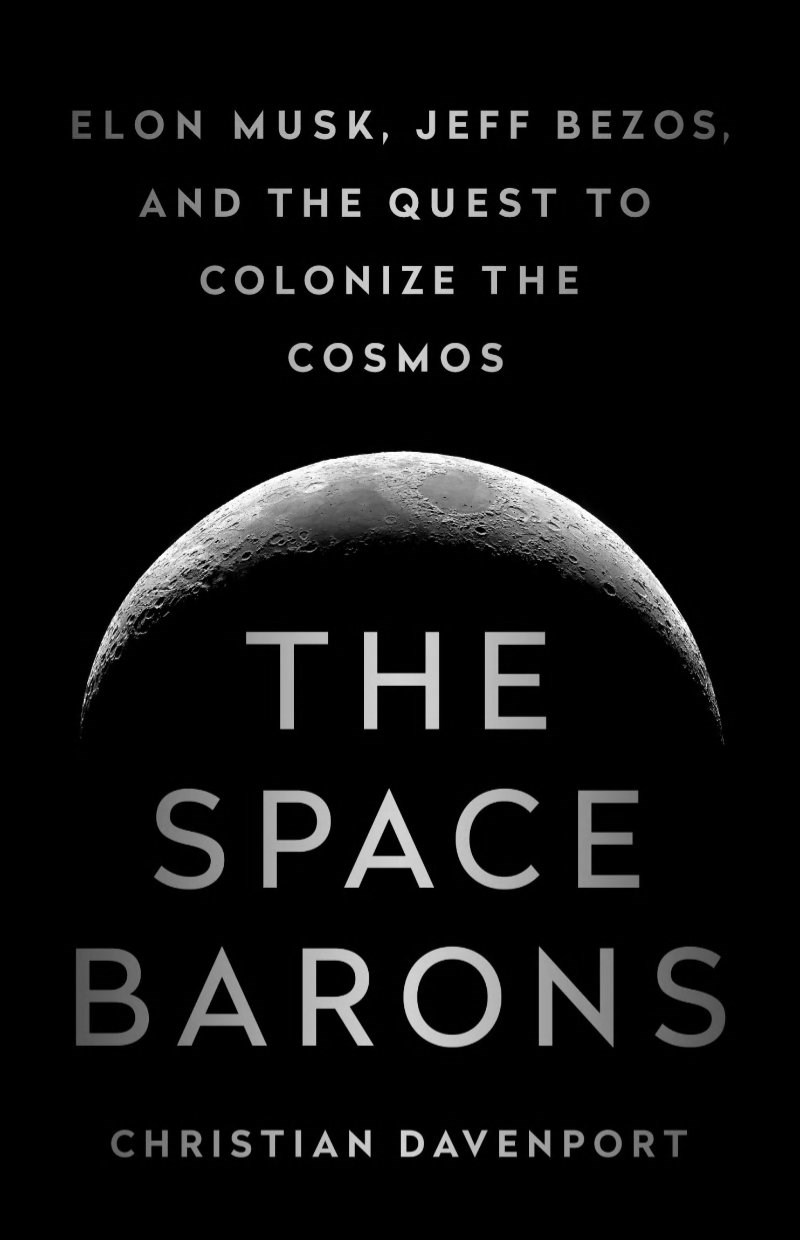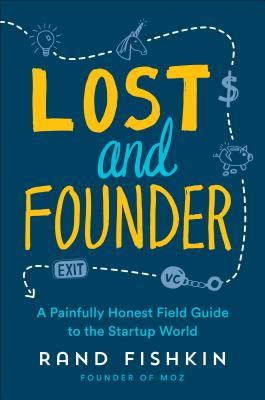Business Books to Watch in April
April 09, 2018
In order of their release dates, these are just 20 of the books that will be the focus of our attentions in April.
In order of their release dates, these are just 20 of the books that will be the focus our attentions in April.
 New Power: How Power Works in Our Hyperconnected World—and How to Make It Work for You by Jeremy Heimans, Henry Timms, Doubleday
New Power: How Power Works in Our Hyperconnected World—and How to Make It Work for You by Jeremy Heimans, Henry Timms, Doubleday
The definitive guide to spreading ideas, building movements, and leaping ahead in our chaotic, connected age. Get the book New York Times columnist David Brooks calls “the best window I’ve seen into this new world.”
Why do some leap ahead while others fall behind in our chaotic, connected age? In New Power, Jeremy Heimans and Henry Timms confront the biggest stories of our time—the rise of mega-platforms like Facebook and Uber; the out-of-nowhere victories of Obama and Trump; the unexpected emergence of movements like #MeToo—and reveal what’s really behind them: the rise of “new power.”
For most of human history, the rules of power were clear: power was something to be seized and then jealously guarded. This “old power” was out of reach for the vast majority of people. But our ubiquitous connectivity makes possible a different kind of power. “New power” is made by many. It is open, participatory, and peer-driven. It works like a current, not a currency—and it is most forceful when it surges. The battle between old and new power is determining who governs us, how we work, and even how we think and feel.
New Power shines fresh light on the cultural phenomena of our day, from #BlackLivesMatter to the Ice Bucket Challenge to Airbnb, uncovering the new power forces that made them huge. Drawing on examples from business, activism, and pop culture, as well as the study of organizations like Lego, NASA, Reddit, and TED, Heimans and Timms explain how to build new power and channel it successfully. They also explore the dark side of these forces: the way ISIS has co-opted new power to monstrous ends, and the rise of the alt-right’s “intensity machine.”
In an era increasingly shaped by new power, this groundbreaking book offers us a new way to understand the world—and our role in it.
 The Excellence Dividend: Meeting the Tech Tide with Work That Wows and Jobs That Last by Tom Peters, Vintage
The Excellence Dividend: Meeting the Tech Tide with Work That Wows and Jobs That Last by Tom Peters, Vintage
Thirty-five years after his iconic In Search of Excellence, bestselling author and management guru Tom Peters is back with his most urgent message yet. A VINTAGE BOOKS ORIGINAL.
For decades, he has been preaching the gospel of putting people first, and in today’s rapidly changing business environment, this message is more important than ever. Gallup numbers show that fewer than one-third of employees feel engaged with their work, and one study suggests that fully half of American jobs are at risk due to technology. But Peters has a solution: a sustained commitment to excellence combined with a commitment to people. These are, he argues, the only tools for coping with and thriving amidst the tsunami of change facing business today.
In The Excellence Dividend, Peters shows that nothing beats a high-quality product or service, designed and delivered by people who are as dedicated to each other as they are to their shared goal. With his unparalleled expertise and inimitable charisma, Peters offers brilliantly simple, actionable guidelines for success that any business leader can immediately implement, punctuated by incisive quotes from some of today’s leading lights in business. The Excellence Dividend is an important new book from one of today’s leading visionaries in business.
 On Grand Strategy by John Lewis Gaddis, Penguin Press
On Grand Strategy by John Lewis Gaddis, Penguin Press
A master class in strategic thinking, distilled from the legendary program the author has co-taught at Yale for decades.
For almost two decades, Yale students have competed for admission each year to the “Studies in Grand Strategy” seminar taught by John Lewis Gaddis, Paul Kennedy, and Charles Hill. Its purpose has been to prepare future leaders for responsibilities they will face, through lessons drawn from history and the classics. Now Gaddis has distilled that teaching into a succinct, sharp and potentially transformational book, surveying statecraft from the ancient Greeks to Franklin D. Roosevelt and beyond. An unforgettable guide to the art of leadership, On Grand Strategy is, in every way, its own master class.
 How Women Rise: Break the 12 Habits Holding You Back from Your Next Raise, Promotion, or Job by Sally Helgesen & Marshall Goldsmith, Hachette Books
How Women Rise: Break the 12 Habits Holding You Back from Your Next Raise, Promotion, or Job by Sally Helgesen & Marshall Goldsmith, Hachette Books
Ready to take the next step in your career… but not sure what's holding you back? Read on.
Leadership expert Sally Helgesen and bestselling leadership coach Marshall Goldsmith have trained thousands of high achievers—men and women—to reach even greater heights. Again and again, they see that women face specific and different roadblocks from men as they advance in the workplace. In fact, the very habits that helped women early in their careers can hinder them as they move up. Simply put, what got you here won't get you there… and you might not even realize your blind spots until it's too late.
Are you great with the details? To rise, you need to do less and delegate more.
Are you a team player? To advance, you need to take credit as easily as you share it.
Are you a star networker? Leaders know a network is no good unless you know how to use it.
Sally and Marshall identify the 12 habits that hold women back as they seek to advance, showing them why what worked for them in the past might actually be sabotaging their future success. Building on Marshall's classic bestseller What Got You Here Won't Get You There, their new book How Women Rise is essential reading for any woman who is ready to advance to the next level.
![]() Sophia of Silicon Valley: A Novel by Anna Yen, William Morrow & Company
Sophia of Silicon Valley: A Novel by Anna Yen, William Morrow & Company
A brilliant young Asian woman navigates the thrilling world of Silicon Valley in the boom years of the tech industry, working for some of the greatest minds of our time, including Steve Jobs and Elon Musk, in this a fast-paced satirical, and revealing novel—drawn from the author’s own experiences—in the spirit of The Devil Wears Prada, Primates of Park Avenue, and Bond Girl.
The daughter of successful Taiwanese immigrants, Sophia Young has always spoken her mind, and in Silicon Valley, that turns out to be her greatest asset—especially when she’s often the only woman in a room. As companies like Apple, Google, Tesla, and Oracle are beginning to revolutionize the world, Sophia lucks into a job that puts her directly in the path of Scott Kraft, the eccentric founder of a groundbreaking software company and CEO of an animated film studio that is transforming the art.
As Scott’s right hand woman, the incorrigibly outspoken Sophia is in the eye of the storm—a thrilling and terrifying position that challenges her, threatens her relationships and even her health, yet ultimately teaches her how to take charge of her own future. But when engineer and inventor Andre Stark hires her to run investor relations, Sophia starts to question whether the big paycheck and high-status career are worth living in a boys-club gone bad.
Sharp, dramatic, and full of insider dish, Sophia of Silicon Valley is an engrossing story of a professional woman storming the corridors of geek power and—and the price of living in the shadows of its eccentric maestros.
 The Go-Giver Influencer: A Little Story About a Most Persuasive Idea by Bob Burg, John David Mann, Portfolio
The Go-Giver Influencer: A Little Story About a Most Persuasive Idea by Bob Burg, John David Mann, Portfolio
From the bestselling authors of The Go-Giver, Go-Givers Sell More, and The Go-Giver Leader comes another compelling parable about the paradox of getting ahead by placing other people’s interests first.
The Go-Giver Influencer is a story about two young, ambitious businesspeople: Gillian Waters, the chief buyer for Smith & Banks, a midsized company that operates a national chain of pet accessory stores; and Jackson Hill, the founder of Angels Clothed in Fur, a small but growing manufacturer of all-natural pet foods.
Each has something the other wants. To Jackson, Smith & Banks represents the possibility of reaching more animals with his products—if he can negotiate terms and conditions that will protect his company’s integrity. To Gillian, Angels Clothed in Fur could give her company a distinctive, uniquely high-quality line that will help them stand out from their competitors—if Angels Clothed in Fur can be persuaded to give them an exclusive.
At first, the negotiations are adversarial and frustrating. Then, coincidentally, Gillian and Jackson each encounter a mysterious yet kindly mentor. Over the next week, while neither one realizes the other is doing the same, both Gillian and Jackson learn the heart of both mentors’ philosophies: The Five Secrets of Genuine Influence.
The story ends in a way that surprises everyone—and with lessons we can all apply in our efforts to resolve conflicts and influence others.
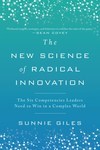 The New Science of Radical Innovation: The Six Competencies Leaders Need to Win in a Complex World by Sunnie Giles, BenBella Books
The New Science of Radical Innovation: The Six Competencies Leaders Need to Win in a Complex World by Sunnie Giles, BenBella Books
Following Sunnie Giles's Harvard Business Review article "The Most Important Leadership Competencies, According to Leaders Around the World," this book uses solid scientific principles to help leaders in any organization navigate successfully through the increasing speed and interdependence in today's market.
Discover a groundbreaking, science-based approach to leadership that catalyzes radical innovation for dramatic—and permanent—results.
Today’s business environment is undergoing a revolutionary transformation, defined by extraordinary levels of VUCA (volatility, uncertainty, complexity, and ambiguity). But most traditional companies are still built for the old-world economy when the new mandate from VUCA requires a fresh leadership approach.
Dr. Sunnie Giles is a new generation expert on radical innovation who takes the mystery out of what radical innovation is and transforms organizations into ones fit to deliver radical innovation. Her in-depth research reveals that applying concepts from neuroscience, complex systems approach, and quantum mechanics can help leaders catalyze radical innovation rapidly. Giles’s breakthrough leadership development program, called Quantum Leadership, is the key to survival in the today’s VUCA market, with huge consequences for organizations’ bottom lines.
The New Science of Radical Innovation provides profound insights and actionable tools to help you accelerate the speed of execution, balance between team cohesion and self-organization, and tap into the power of collective wisdom. Inside, discover how to develop the six leadership competencies you need to catalyze radical innovation in your organization:
- Self Management
- Providing Safety
- Creating Differentiation
- Strengthening Connection
- Facilitating Learning
- Stimulating Radical Innovation
This book will help you redefine how value is created in your industry.
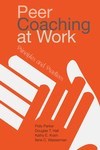 Peer Coaching at Work: Principles and Practices by Polly Parker, Douglas T. (Tim) Hall, Kathy E. Kram, and Ilene C. Wasserman, Stanford Business Books
Peer Coaching at Work: Principles and Practices by Polly Parker, Douglas T. (Tim) Hall, Kathy E. Kram, and Ilene C. Wasserman, Stanford Business Books
Peer coaching, a mentoring process for individuals of equal status, is a highly effective, but underused professional development tool. This book provides the first rigorously researched and road tested three-part model for fostering peer coaching relationships at work.
When it comes to mentoring, peer coaching is an undervalued workhorse. It's effective, inexpensive, widely applicable, and relatively easy to implement. Many coaches consider it to be the next wave in professional development. Peer Coaching at Work draws on research and practice to deliver a hands-on guide to this powerful relational learning technique.
The authors—all leaders in the field—present a rigorously tested three-part model for facilitating peer coaching relationships in one-on-one settings and in larger groups. With lively case studies, they define peer coaching as a focused relationship between equals who supportively learn from, actively listen to, and judiciously question each other, which leads to breakthroughs that may otherwise lie dormant in one's career. A fundamental guide for anyone with an interest in mentoring and transformational learning, this book is a must-have for the talent management bookshelf.
 The Myth of the Nice Girl: Achieving a Career You Love Without Becoming a Person You Hate by Fran Hauser, Houghton Mifflin Harcourt
The Myth of the Nice Girl: Achieving a Career You Love Without Becoming a Person You Hate by Fran Hauser, Houghton Mifflin Harcourt
A candid guide for ambitious women who want to succeed without losing themselves in the process.
In The Myth of the Nice Girl, Fran Hauser deconstructs the negative perception of "niceness" that many women struggle with in the business world. If women are nice, they are seen as weak and ineffective, but if they are tough, they are labeled a bitch.
Hauser proves that women don’t have to sacrifice their values or hide their authentic personalities to be successful. Sharing a wealth of personal anecdotes and time-tested strategies, she shows women how to reclaim “nice” and sidestep regressive stereotypes about what a strong leader looks like. Her accessible advice and hard-won wisdom detail how to balance being empathetic with being decisive, how to rise above the double standards that can box you in, how to cultivate authentic confidence that projects throughout a room, and much more.
The Myth of the Nice Girl is a refreshing dose of forward-looking feminism that will resonate with smart, professional women who know what they want and are looking for real advice to take their career to the next level without losing themselves in the process.
 The Efficiency Paradox: What Big Data Can't Do by Edward Tenner, Knopf
The Efficiency Paradox: What Big Data Can't Do by Edward Tenner, Knopf
A bold challenge to our obsession with efficiency—and a new understanding of how to benefit from the powerful potential of serendipity.
Algorithms, multitasking, the sharing economy, life hacks: our culture can’t get enough of efficiency. One of the great promises of the Internet and big data revolutions is the idea that we can improve the processes and routines of our work and personal lives to get more done in less time than we ever have before. There is no doubt that we’re performing at higher levels and moving at unprecedented speed, but what if we’re headed in the wrong direction?
Melding the long-term history of technology with the latest headlines and findings of computer science and social science, The Efficiency Paradox questions our ingrained assumptions about efficiency, persuasively showing how relying on the algorithms of digital platforms can in fact lead to wasted efforts, missed opportunities, and above all an inability to break out of established patterns. Edward Tenner offers a smarter way of thinking about efficiency, revealing what we and our institutions, when equipped with an astute combination of artificial intelligence and trained intuition, can learn from the random and unexpected.
 Cousins Maine Lobster: How One Food Truck Became a Multimillion-Dollar Business by Jim Tselikis, Sabin Lomac, St. Martin's Press
Cousins Maine Lobster: How One Food Truck Became a Multimillion-Dollar Business by Jim Tselikis, Sabin Lomac, St. Martin's Press
From the co-founders of the smash hit Cousins Main Lobster food trucks comes a business book revealing to new entrepreneurs how the authors built their brand through integrity and authenticity.
In early 2012, Jim Tselikis visited L.A. and met up with his cousin Sabin Lomac. Over a few drinks they waxed nostalgic about their childhood in Maine, surrounded by family, often elbow deep in delicious lobster while gathered around the picnic table. From this strong memory was born the very first Cousins Maine Lobster food truck. Smart, authentic marketing, and sustainable, delicious ingredients helped turn that one food truck into an overnight sensation. Then, in just three years, they went from a single food truck to a nationally-franchised legion of trucks, an online delivery service, and a brick-and-mortar restaurant, grossing over $15 million dollars in net profits a year.
Start-up fever has taken hold of America, and there are hundreds of books to teach readers how to become an entrepreneur; this is the first book to answer the question: What’s next? At each step, Jim and Sabin were faced with hard decisions—opening each new food truck carefully instead of rushing to meet the demand; turning down a six-figure franchise offer because it came from someone who didn’t support their vision; turning down Shark Tank (twice) until they could insist on participating only if Barbara Corcoran was one of the Sharks. Now Jim and Sabin teach readers how they, too, can reach the next level of success in their own businesses, without having to compromise themselves.
 The Space Barons: Elon Musk, Jeff Bezos, and the Quest to Colonize the Cosmos by Christian Davenport, PublicAffairs
The Space Barons: Elon Musk, Jeff Bezos, and the Quest to Colonize the Cosmos by Christian Davenport, PublicAffairs
The historic quest to rekindle the human exploration and colonization of space led by two rivals and their vast fortunes, egos, and visions of space as the next entrepreneurial frontier.
The Space Barons is the story of a group of billionaire entrepreneurs who are pouring their fortunes into the epic resurrection of the American space program. Nearly a half-century after Neil Armstrong walked on the moon, these Space Barons—most notably Elon Musk and Jeff Bezos, along with Richard Branson and Paul Allen—are using Silicon Valley-style innovation to dramatically lower the cost of space travel, and send humans even further than NASA has gone. These entrepreneurs have founded some of the biggest brands in the world—Amazon, Microsoft, Virgin, Tesla, PayPal—and upended industry after industry. Now they are pursuing the biggest disruption of all: space.
Based on years of reporting and exclusive interviews with all four billionaires, this authoritative account is a dramatic tale of risk and high adventure, the birth of a new Space Age, fueled by some of the world's richest men as they struggle to end governments' monopoly on the cosmos. The Space Barons is also a story of rivalry-hard-charging startups warring with established contractors, and the personal clashes of the leaders of this new space movement, particularly Musk and Bezos, as they aim for the moon and Mars and beyond.
 Prediction Machines: The Simple Economics of Artificial Intelligence by Ajay Agrawal, Joshua Gans, and Avi Goldfarb, Harvard Business Review Press
Prediction Machines: The Simple Economics of Artificial Intelligence by Ajay Agrawal, Joshua Gans, and Avi Goldfarb, Harvard Business Review Press
"What does AI mean for your business? Read this book to find out." —Hal Varian, Chief Economist, Google
Artificial intelligence does the seemingly impossible, magically bringing machines to life—driving cars, trading stocks, and teaching children. But facing the sea change that AI will bring can be paralyzing. How should companies set strategies, governments design policies, and people plan their lives for a world so different from what we know? In the face of such uncertainty, many analysts either cower in fear or predict an impossibly sunny future.
But in Prediction Machines, three eminent economists recast the rise of AI as a drop in the cost of prediction. With this single, masterful stroke, they lift the curtain on the AI-is-magic hype and show how basic tools from economics provide clarity about the AI revolution and a basis for action by CEOs, managers, policy makers, investors, and entrepreneurs.
When AI is framed as cheap prediction, its extraordinary potential becomes clear:
- Prediction is at the heart of making decisions under uncertainty. Our businesses and personal lives are riddled with such decisions.
- Prediction tools increase productivity—operating machines, handling documents, communicating with customers.
- Uncertainty constrains strategy. Better prediction creates opportunities for new business structures and strategies to compete.
Penetrating, fun, and always insightful and practical, Prediction Machines follows its inescapable logic to explain how to navigate the changes on the horizon. The impact of AI will be profound, but the economic framework for understanding it is surprisingly simple.
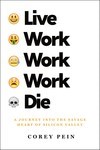 Live Work Work Work Die: A Journey into the Savage Heart of Silicon Valley by Corey Pein, Metropolitan Books
Live Work Work Work Die: A Journey into the Savage Heart of Silicon Valley by Corey Pein, Metropolitan Books
A scathing exploration into the heart of Silicon Valley, laying bare the greed, hubris, and retrograde politics of an industry that aspires to radically transform society for its own benefit.
At the height of the startup boom, journalist Corey Pein set out for Silicon Valley with little more than a smartphone and his wits. His goal: to learn how such an overhyped industry could possibly sustain itself as long as it has. Determined to cut through the clichés of big tech—the relentless optimism, the incessant repetition of vacuous buzzwords—Pein decided that he would need to take an approach as unorthodox as the companies he would soon be covering. To truly understand the delirious reality of a Silicon Valley entrepreneur, he knew, he would have to inhabit that perspective—he would have to become an entrepreneur. Thus he begins his journey—skulking through gimmicky tech conferences, pitching his over-the-top business ideas to investors, and interviewing a cast of outrageous characters: cyborgs and con artists, Teamsters and transhumanists, jittery hackers and naive upstart programmers whose entire lives are managed by their employers—who work endlessly and obediently, never thinking to question their place in the system.
In showing us this frantic world, Pein challenges the positive self-image that the tech tycoons have crafted—as benevolent creators of wealth and opportunity—to reveal their self-justifying views and their insidious visions for the future. Vivid and incisive, Live Work Work Work Die is a troubling portrait of a self-obsessed industry bent on imposing its disturbing visions on the rest of us.
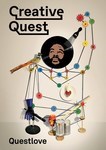 Creative Quest by Questlove, Ecco
Creative Quest by Questlove, Ecco
A unique new guide to creativity from Questlove—inspirations, stories, and lessons on how to live your best creative life.
Questlove—musician, bandleader, designer, producer, culinary entrepreneur, professor, and all-around cultural omnivore—shares his wisdom on the topics of inspiration and originality in a one-of-a-kind guide to living your best creative life.
In Creative Quest, Questlove synthesizes all the creative philosophies, lessons, and stories he’s heard from the many creators and collaborators in his life, and reflects on his own experience, to advise readers and fans on how to consider creativity and where to find it. He addresses many topics—what it means to be creative, how to find a mentor and serve as an apprentice, the wisdom of maintaining a creative network, coping with critics and the foibles of success, and the specific pitfalls of contemporary culture—all in the service of guiding admirers who have followed his career and newcomers not yet acquainted with his story.
Whether discussing his own life or channeling the lessons he’s learned from forefathers such as George Clinton, collaborators like D’Angelo, or like-minded artists including Ava DuVernay, David Byrne, Björk, and others, Questlove speaks with the candor and enthusiasm that fans have come to expect. Creative Quest is many things—above all, a wise and wide-ranging conversation around the eternal mystery of creativity.
 Lost and Founder: A Painfully Honest Field Guide to the Startup World by Rand Fishkin, Portfolio
Lost and Founder: A Painfully Honest Field Guide to the Startup World by Rand Fishkin, Portfolio
Rand Fishkin, the founder and former CEO of Moz, reveals how traditional Silicon Valley “wisdom” leads far too many startups astray, with the transparency and humor that his hundreds of thousands of blog readers have come to love.
Everyone knows how a startup story is supposed to go: A young, brilliant entrepreneur has a cool idea, drops out of college, defies the doubters, overcomes all odds, makes billions, and becomes the envy of the technology world.
This is not that story.
It’s not that things went badly for Rand Fishkin; they just weren’t quite so Zuckerberg-esque. His company, Moz, maker of marketing software, is now a $45 million/year business, and he’s one of the world’s leading experts on SEO. But his business and reputation took fifteen years to grow, and his startup began not in a Harvard dorm room but as a mother-and-son family business that fell deeply into debt.
Now Fishkin pulls back the curtain on tech startup mythology, exposing the ups and downs of startup life that most CEOs would rather keep secret. For instance: A minimally viable product can be destructive if you launch at the wrong moment. Growth hacking may be the buzzword du jour, but initiatives can fizzle quickly. Revenue and growth won’t protect you from layoffs. And venture capital always comes with strings attached.
Fishkin’s hard-won lessons are applicable to any kind of business environment. Up or down the chain of command, at both early stage startups and mature companies, whether your trajectory is riding high or down in the dumps: this book can help solve your problems, and make you feel less alone for having them.
 Great American Outpost: Dreamers, Mavericks, and the Making of an Oil Frontier by Maya Rao, PublicAffairs
Great American Outpost: Dreamers, Mavericks, and the Making of an Oil Frontier by Maya Rao, PublicAffairs
The story of the twenty-first-century gold rush to the gas and oil fields of North Dakota—and of the migrants, criminals, and oil barons willing to do whatever it takes to cash in.
A surreal, lyrical work of narrative nonfiction that portrays how the largest domestic oil discovery in half a century transformed a forgotten corner of the American West into a crucible of breakneck capitalism.
As North Dakota became the nation's second-largest oil producer, Maya Rao set out in steel-toe boots to join a wave of drifters, dreamers, entrepreneurs, and criminals. With an eye for the dark, absurd, and humorous, Rao fearlessly immersed herself in their world to chronicle this modern-day gold rush, from its heady beginnings to OPEC's price war against the US oil industry. She rode shotgun with a surfer-turned-truck driver braving toxic fumes and dangerous roads, dined with businessmen disgraced during the financial crisis, and reported on everyone in between—including an ex-con YouTube celebrity, a trophy wife mired in scandal, and a hard-drinking British Ponzi schemer—in a social scene so rife with intrigue that one investor called the oilfield Peyton Place on steroids.
As the boom receded, a culture of greed and recklessness left troubling consequences for investors and longtime residents. Empty trailers and idle oil equipment littered the fields like abandoned farmsteads, leaving the pioneers who built this unlikely civilization to reckon with their legacy. Part Barbara Ehrenreich, part Upton Sinclair, Great American Outpost is a sobering exploration of twenty-first-century America that reads like a frontier novel.
 When the Wolves Bite: Two Billionaires, One Company, and an Epic Wall Street Battle by Scott Wapner, PublicAffairs
When the Wolves Bite: Two Billionaires, One Company, and an Epic Wall Street Battle by Scott Wapner, PublicAffairs
The inside story of the clash of two of Wall Street's biggest, richest, toughest, most aggressive players—Carl Icahn and Bill Ackman—and Herbalife, the company caught in the middle.
With their billions of dollars and their business savvy, activist investors Carl Icahn and Bill Ackman have the ability to move markets with the flick of a wrist. But what happens when they run into the one thing in business they can't control: each other?
This fast-paced book tells the story of the clash of these two titans over Herbalife, a nutritional supplement company whose business model Ackman questioned. Icahn decided to vouch for them, and the dispute became a years-long feud, complete with secret backroom deals, public accusations, billions of dollars in stock trades, and one dramatic insult war on live television. Wapner, who hosted that memorable TV show, has gained unprecedented access to all the players and unravels this remarkable war of egos, showing the extreme measures the participants were willing to take.
When the Wolves Bite is both a rollicking, entertaining read--a great business story of money and power and pride.
 Unsafe Thinking: How to be Nimble and Bold When You Need It Most by Jonah Sachs, Da Capo Lifelong Books
Unsafe Thinking: How to be Nimble and Bold When You Need It Most by Jonah Sachs, Da Capo Lifelong Books
Learn how to take the bold yet intelligent risks that will help you thrive in business—and in life.
How can you challenge and change yourself when you need it most? We're creatures of habit, programmed by evolution to favor the safe and familiar, especially when the stakes are high. This bias no longer serves us in a world of constant change. In fact, today, safe thinking has become extremely dangerous.
Through stories of trailblazers in business, health, education, and activism, and leveraging decades of research into creativity and performance, Jonah Sachs reveals a path to higher performance and creativity for anyone ready to step out of their comfort zone. He introduces troublemakers willing to challenge corporate culture like the executive who convinced CVS to drop its multibillion-dollar tobacco business. She now leads the pharmacy giant. Readers will get firsthand accounts of breaking from the status quo from a Nobel prize winning doctor who nearly got himself thrown out medicine, a two-time NBA championship coach who brought joy back to his team by tuning down the focus on competition, a CEO who rebuilt her reputation and life from the ashes from one of the biggest flops in internet history and a Colombian mayor who started an incredibly successful career of political reform by mooning an angry crowd.
Unsafe Thinking is full of counter-intuitive insights that will challenge you to rethink how you work. You'll learn:
- Why your area of deep expertise is often where you'll find your biggest blind spots
- Why anxiety can be fuel for creativity
- When to trust intuition and when to challenge it
- How collaborating only with those that share your values stunts your creativity
- How to build an organization that embraces intelligent risk.
An inspiring and accessible read, Unsafe Thinking has the power to change both the way you approach your work and your life.
 Edge of Chaos: Why Democracy Is Failing to Deliver Economic Growth—and How to Fix It by Dambisa Moyo, Basic Books
Edge of Chaos: Why Democracy Is Failing to Deliver Economic Growth—and How to Fix It by Dambisa Moyo, Basic Books
From an internationally acclaimed economist, a provocative call to jump-start economic growth by aggressively overhauling liberal democracy.
Around the world, people who are angry at stagnant wages and growing inequality have rebelled against established governments and turned to political extremes. Liberal democracy, history's greatest engine of growth, now struggles to overcome unprecedented economic headwinds—from aging populations to scarce resources to unsustainable debt burdens. Hobbled by short-term thinking and ideological dogma, democracies risk falling prey to nationalism and protectionism that will deliver declining living standards.
In Edge of Chaos, Dambisa Moyo shows why economic growth is essential to global stability, and why liberal democracies are failing to produce it today. Rather than turning away from democracy, she argues, we must fundamentally reform it. Edge of Chaos presents a radical blueprint for change in order to galvanize growth and ensure the survival of democracy in the twenty-first century.


